The Daughters of Liberty: A Definition for the Revolutionary Sentiment
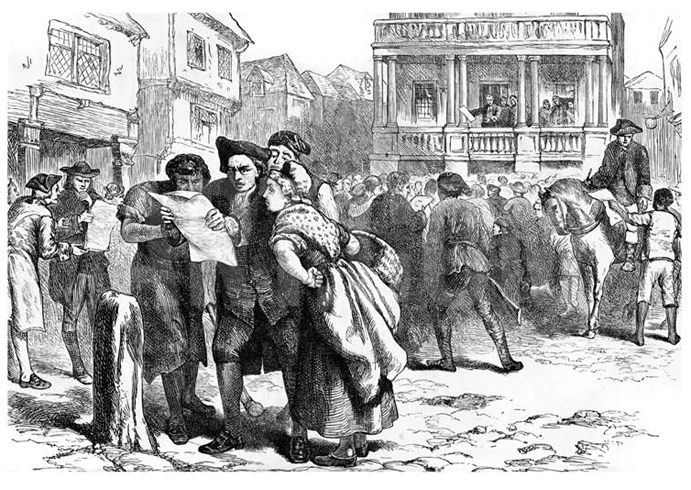
Bostonians Reading the Stamp Act. Source: Wikimedia Commons (Public Domain).
Organized after the Stamp Act in 1765, the Daughters of Liberty aided in the anti-British boycott. The group, composed entirely of women, became the sister group to the Sons of Liberty. Though the groups started locally, chapters soon appeared in each colony. The patriotic group encouraged colonists to boycott by organizing and participating in various events.
Stamp Act 1765- Act imposed by Britain in 1765 stating that all printed goods were to carry a stamp, the act greatly affected influential colonists in America
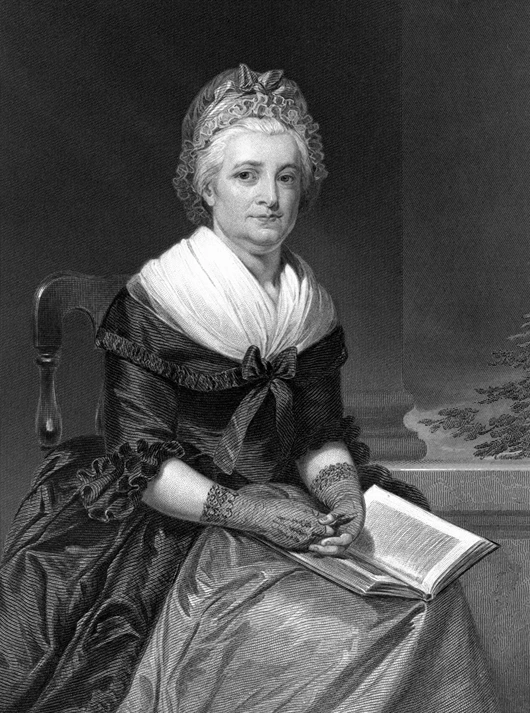
Portrait of Martha Washington. Source: Wikimedia Commons (Public Domain).
Daughters of Liberty: The Boycotts
Britain levied taxes on the colonists to aid in funding the war debt incurred by the Seven Years' War. For example, the Stamp Act of 1765 mandated stamps on all printed goods. The act negatively impacted influential colonists who began to take a stance against the British parliament. Colonists organized groups such as the Sons of Liberty to promote anti-parliament sentiment. Consequently, colonists boycotted British imported goods such as tea and cloth.
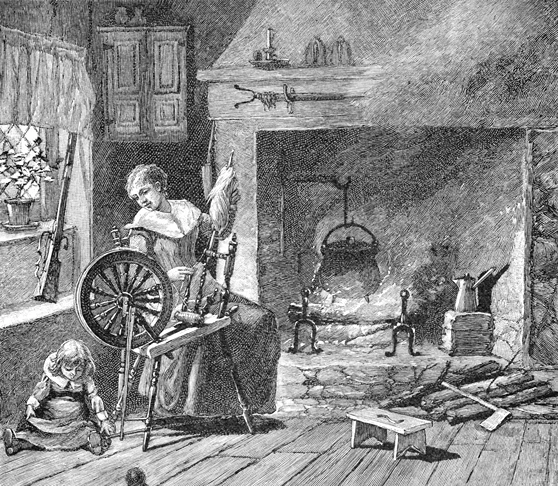
Colonial Kitchen with woman spinning. Source: Wikimedia Commons (Public Domain).
The Daughters of Liberty, solely composed of women, wished to show their loyalty by also boycotting British goods.
With the passing of the Townshend Acts, the Daughters of Liberty organized various events to influence colonial participation, reigniting the boycott of British goods. The group began making tea and producing fabric. To avoid buying British tea, women created their own from various plants and called it Liberty Tea. The group ultimately became domestic manufacturers of everyday items. The women initiated a particularly influential movement surrounding the creation of homemade cloth. The group organized events known as spinning bees, where groups of women competed to see who could make the finest cloth. Newspapers quickly picked up the spinning bee movement and circulated articles describing the significant events. While the women did not participate in the initial decision to boycott, they dedicated themselves to the cause. Thus, helping to provide a strong economic foundation for a successful boycott.
On the 4th instant eighteen daughters of liberty, young ladies of good reputation, assembled at the house of doctor Ephraim Brown, in this town, in consequence of an invitation of that gentleman, who had discovered a laudable zeal for the introducing Home Manufacturers. There they exhibited a fine example of industry, by spinning from sunrise until dark, and displayed a spirit for saving their sinking country, rarely to be found among persons of more age and experience.” –The Boston Gazette on Spinning Bees, April 7th, 1766.1
As seen in the excerpt above, spinning bees became an important event for women in colonial America. The spinning bees not only helped support the anti-British cause but became an event to unite women.
Townshend Acts: Enacted in 1767 by Britain, the act imposed taxes on lead, tea, paper, paint, and glass
Daughters of Liberty: Members
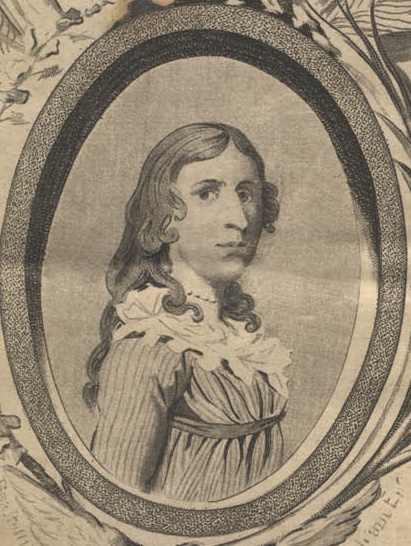
Deborah Sampson. Source: Wikimedia Commons (Public Domain).
| Members of the Daughters of Liberty: |
| Martha Washington |
| Esther de Berndt |
| Sarah Fulton |
| Deborah Sampson |
| Elizabeth Dyar |
Did you know?
Abigail Adams was closely associated with the Daughters of Liberty but was not an official member.
Uniting Colonial Women
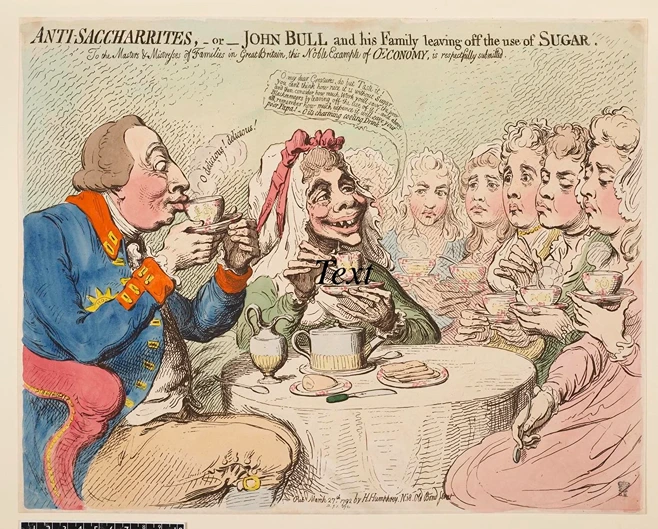
Anti-Saccharites or John Bull and his Family leaving off the use of sugar. Source: Wikimedia Commons (Public Domain).
The Daughters of Liberty created new significance for women whose household chores had taken on new power and prestige. Social class lines became blurred with the efforts of the Daughters of Liberty. The wealthy elite and country farmers all participated in boycotting the British. The elite often refused to purchase fine cloth and linens imported by the British. The social equality created through the group spread throughout the colonies. For example, a young farm girl from Connecticut proudly stated:
That she had carded all day, then spun ten knots of wool in the evening, & felt Nationally into the bargain.'"2
The Daughters of Liberty united women throughout the colonies, and though women still did not have any rights, the movement would start the foundation for women's rights later on.
Hannah Griffitts and "The Female Patriots"
Women became so involved in the patriotic cause that they started to voice opinions against the men of the Sons of Liberty. They believed that the men's convictions were not as strong as their own. Written by Hannah Griffitts, The Female Patriots poem describes the feelings of the Daughters of Liberty.
The Female Patriots
…If the sons (so degenerate) The Blessings despise
Let the Daughters of Liberty nobly arise;
And tho’ we’ve no Voice, but a negative here.
The use of the Taxables, let us forebear,
(Then merchants import till your Stores are full,
May the buyers be few and your Traffic be dull.)
Stand firmly resolv’d & bid Grenville [Prime Minister of Great Britain] to see
That rather than Freedom, we'll part with our tea.
And well as we love the dear Draught when a dry,
As American Patriots, our Taste we deny…”3
The Coffee Party
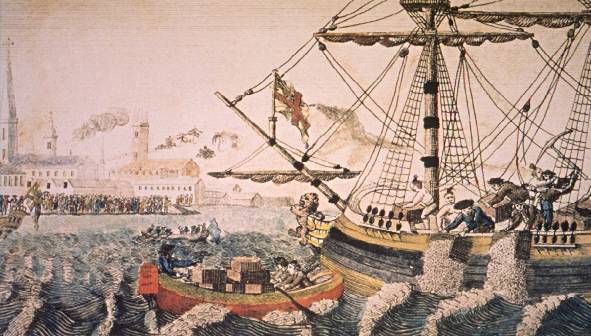
Boston Tea Party. Source: Wikimedia Commons (Public Domain).
The Daughters of Liberty took matters into their own hands in 1777 and organized their version of the Boston Tea Party. Finding a wealthy merchant storing excess coffee in his warehouse, the group took the coffee and drove away. Abigail Adams wrote to John Adams recounting the event:
A Number of Females, some say a hundred, some say more assembled with a cart and trucks, marched down to the Ware House, and demanded the keys, which he refused to deliver, upon which one of them seized him by his Neck and tossed him into the cart." -Abigail Adams4
Impact of the Daughters of Liberty
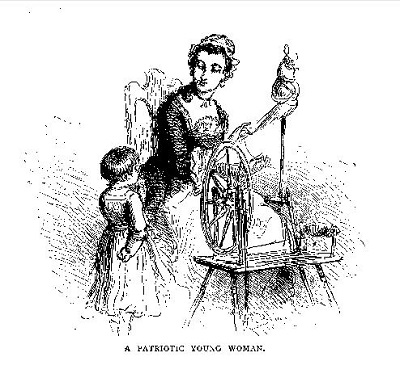
A Patriotic Young Woman. Source: Wikimedia Commons.
The Daughters of Liberty impacted colonial life and created a foundation for other women in the American Revolution. While spinning bees became popular throughout the colonies as acts of rebellion, they solidified women's influence in political affairs without direct participation. While not having the right to vote, colonial women paved a road for the future of American women. For example, controlling the household purchasing power allowed colonial women to influence political action indirectly. Ultimately, the Daughters of Liberty strongly influenced Britain's profit from imported goods. Consequently, importing British goods fell by almost half. While the group influenced political and economic outcomes, they also created unique opportunities for colonial women.
The events and boycotts organized by the group created a socially equal environment where both wealthy elite and country farmers could participate in the patriotic cause. While participation in the boycotts did not give women complete access to the political realm, it later created a foundation for women's rights.
Daughters of Liberty - Key takeaways
- The Daughters of Liberty was a patriotic group created by the Sons of Liberty in response to the British levying taxes.
- The Daughters of Liberty encouraged and supported colonists to boycott British goods by:
- becoming manufacturers of everyday items such as tea and fabric.
- the boycott cut British imports by almost 50%.
- Spinning Bees became an important event where women competed to see who could make the best fabric.
- the spinning bees united women of all social classes.
- Though women did not have many rights during this time, the Daughters of Liberty helped start a foundation for women's rights.
1. The Boston Gazette and Country Journal, April 7, 1766.2. Mary Norton, Liberty's Daughters: The Revolutionary Experience of American Women, 1750.
3. Hannah Griffitts, The Female Patriots, 1768.
4. Abigail Adams, "Letter to John Adams, 1777," (n.d.).














